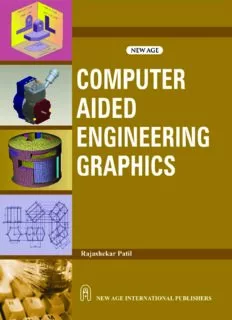
Computer Aided Engineering Graphics: (as Per the New Syllabus, B. Tech. I Year of U.P. Technical University) PDF
Preview Computer Aided Engineering Graphics: (as Per the New Syllabus, B. Tech. I Year of U.P. Technical University)
This page intentionally left blank Copyright © 2009, New Age International (P) Ltd., Publishers Published by New Age International (P) Ltd., Publishers All rights reserved. No part of this ebook may be reproduced in any form, by photostat, microfilm, xerography, or any other means, or incorporated into any information retrieval system, electronic or mechanical, without the written permission of the publisher. All inquiries should be emailed to [email protected] ISBN (13) : 978-81-224-2977-0 PUBLISHING FOR ONE WORLD NEW AGE INTERNATIONAL (P) LIMITED, PUBLISHERS 4835/24, Ansari Road, Daryaganj, New Delhi - 110002 Visit us at www.newagepublishers.com PREFACE The communication of the ideas through the graphical language is the oldest form of communication among humans; all it requires is some kind of equipment to form an image. We might recall the prehistoric era where mankind used the stick to scratch out a message on the sand or certain ancient alphabets were in the form of the pictures. Engineering graphics is a study which requires special equipment or tools to form the images. The tools can be simple pencil and draft board or a computer controlled drafting device. From time to time several attempts were made to make the creation of the objects by graphical means. The Engineering Graphics has evolved from primitive hand drawing to instrument drawings to present computer 2D find 3D drafting. Today the default industry standard is to use computerized drawings. The computerized drawings have their advantages of storage and retrieval, ease of modification, transmission. Further the most important factor is the accuracy of creation of overall design and specially curves which no hand drawing can match. Educational institutions are aware of the present needs of the industry and slowly switching from the drawing boards to computers in their classrooms. With the introduction of computer drawings the students are able to create better and faster drawings more accurately, be it any complicacy in the engineering drawing. Further, there is less likelihood of making mistakes and at the same time avoid the conventional time consuming procedures in creating the drawings. Many engineering institutions worldwide have adopted this approach to increase the employ- ability quotient of the students. Think3 Company is working hard to make students friendlier to the industry by introducing CAD software complementing the existing course curriculum at the universities. Think3 is committed to provide the required training to the trainers on the software for use in the class- room. Think3 is proud to present the Engineering Graphics module for the ITI, Diploma and engineering students. The module presented here will not only align with the existing Engineering Graphics subject for various university students but the format of the course will also support the e-learning for the students. Now the students can learn the basics of Engineering Graphics by using Think3 software from ITALY. The subject matter and the material coverage is the same as what they would like to cover in the regular curriculum. This is an attempt to make students learn how to use world’s most advanced graphical software to create engineering graphics. Although enough care has been taken in preparation of the book, yet some errors might have crept in. Healthy suggestions/comments/feedbacks are welcome in this regard. Last but not the least, I am thankful to New Age International (P) Limited Publishers for taking interest to publish the book in a short span of period with a nice get up. Author This page intentionally left blank BASIC SKETCHING COMMANDS The commands used are of windows based. Just by selecting the icon of the command, the operation can be executed. Three modules commands are used they are Drawing (draft) environment. Sl. Drawing (draft) Think3 Commands Tool No. environment commands (Icon) 1. Select tool Select Entity 2. Point Absolute/Delta Point 3. Line Two-Point Line 4. Curve Insert Curve through Control Points 5. Arc by 3 points Three-Point Circle 6. Arc by center point Radius Circle 7. Circle by center point Center Circle 8. Rectangle Rectangle 9. Fillet Fillet 10. Chamfer Chamfer 11. Trim Trim/Extend Curves 12. Trim corner Operation performed by Trim/Extend Curves 13. Extend to next Trim/Extend Curves with Limits 14. Split Split Curve 15. Offset Offset on Plane 16. Fill Cross Hatch 17. Move Move/Copy Entities 18. Rotate Operation performed by Move/Copy Entities 19. Mirror Mirror Entities 20. Scale Scale Entities 21. Stretch Multistretch Entities 22. Smart dimension Smart Dimension 23. Distance between Operation performed by Smart Dimension 24. Angle between Operation performed by Smart Dimension 25. Leader Label Dimension 26. Text Insert Text 27. Character map No similar command in think3 28. Connect Join Curve 29. Parallel Parallel Line 30. Perpendicular Snap to Perpendicular 31. Concentric No similar command in think3, but the same result can be achieved by Snap to Arc Center command 32. Collinear Collinearity Constraint But cannot be used in Drawing 33. Rigid No similar command in think3 34. Tangent Snap to Tangent 35. Equal Equal Length/Radius Constraint But cannot be used in Drawing 36. Lock Ground Constraint But cannot be used in Drawing 37. Symmetric Symmetry Constraint But cannot be used in Drawing 38. Zoom Zoom Window 39. Pan Pan View 40. Fit Fit View ■ ■ ■
